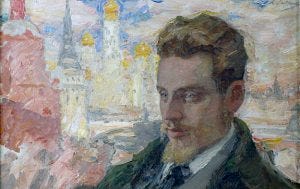In 1902, a young cadet named Franz Kappus decided he’d rather be a writer than possess a military career.
A general avoider of life’s excruciating demands, and unsure of how to face this newborn inclination, he decided to pen a letter to his idol: an Austrian poet by the name of Rainer Maria Rilke (also a former cadet, and denouncer of life’s excruciating demands)
What was meant to be a one-off letter asking for advice blossomed into a correspondence that lasted until 1908, when life finally pushed Kappus “into domains which the poet’s warm, tender and moving concern had precisely wanted to protect [him] from”1
These letters were published in 1929. They sit beside me currently, encased in a Penguin Little Black Classic, Rilke’s musings immortalised in the pages. In one of them, he writes, “You will experience the immense pleasure of reading this book for the first time, and will pass through its innumerable surprises as if in a new dream. But I can tell you that later too one always traverses these books with the same astonishment and that they lost nothing of the wondrous power, relinquish none of the magical qualities, which they lavish on the reader the first time round”2. I can safely say now, after three thorough readings in which I raced through the pages, pen highlighting line after line, that a large amount of pleasure, of awe, and a feeling of wonderment did take over me.
These ‘Letters To A Young Poet’ contain notes on art, life and solitude; mantras for a creative youth that is struggling to stay afloat in the sea that is ordinary life. For those having a difficult time with their artistic expression, there is a thread throughout the letters from which creative advice dangles, which the aspiring artist can pluck off and keep in their pocket. For those feeling alienated from their peers, he informs them of the joys of solitude. Rilke’s advice echoes even a century later—lost or lovelorn, there is a letter from Rilke, to you.
I find the existence of these letters striking, not only because of their timelessness and the valuable insight they provide into what occupied the mind of a great poet like Rilke, but because of the sincerity with which they were borne out of. In his second letter to Kappus, he says, “...for at bottom, and particularly in the deepest and most important things, we are unutterably alone, and for one person to be able to advise, let alone help, another, a great deal must come about, a great deal must come right, a whole constellation of things must concur for it to be possible at all”3
And it seems that “a whole constellation of things” did occur for Kappus, for he got the advice of his favourite poet; gentle, assuring advice that every young person covets in a time of transition. But the fact that Rilke chose to write back is equally important—Kappus’ letters were found in the Rilke family estate in 2017, so we can assume that the correspondence had as much of an effect on him as it did on Kappus. In 1902, two young poets (Rilke was only twenty seven at the time) were brought together by happenstance—and the result was this wonderful collection.
I’ve always been arrested by pieces where an artist details their process, and one of my favourite pastimes is talking to my friends about their creative pursuits. ‘Letters To A Young Poet’ contains both of these things. This correspondence is also, to me, evidence that artists will always be drawn to other artists. Sometimes it feels as though there’s a red thread connecting all of us, and it may be why we still read these letters even today. When Kappus published them, he not only shared Rilke’s thoughts, insights and encouragements—he also brought together artists across time.
A poet and a cadet once spent six years writing to each other. Today I, and many others around the world no doubt, read these letters and are enveloped by the same bond they felt. All we want, in the end, is to have all the answers and to not be left alone—or for a writer to send us book recommendations and their thoughts on irony.
FURTHER READING
Can Rilke Change Your Life? — by Kamran Javadizadeh, The New Yorker
Who Exactly Was Rilke’s Young Poet Correspondent? — by Damion Searls, LitHub
Rilke on Writing and What It Takes to Be an Artist — by Maria Popova, The Marginalian
preface to ‘Letters To A Young Poet’
dated 23rd April, 1903
dated 05th April, 1903



